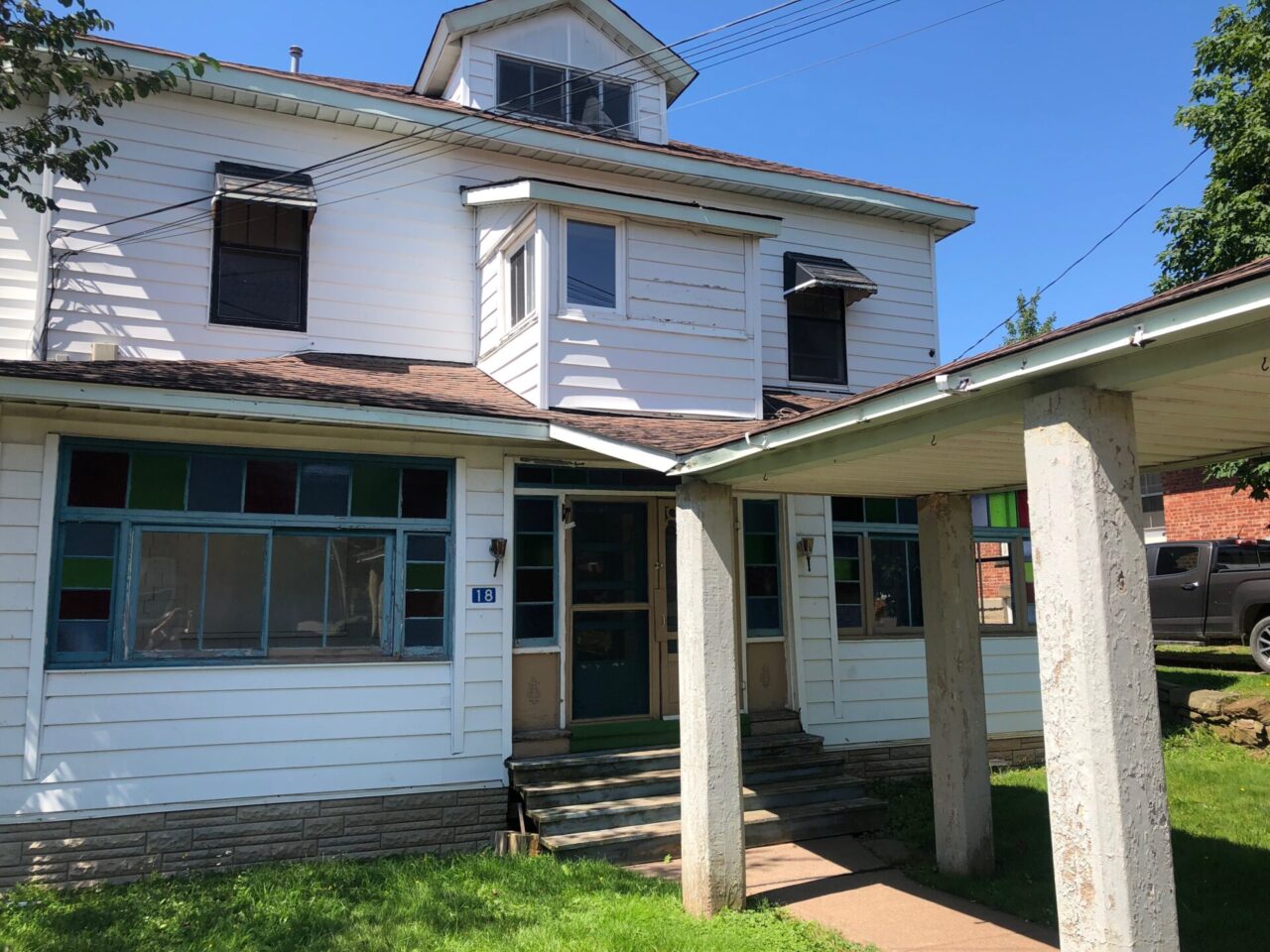
A tenants advocacy group says New Brunswick’s renoviction laws are not working to protect tenants because they are not enforced, and rely on tenants for follow up. NB ACORN chair Nichola Taylor says that seems to be the case in a Sackville apartment building this summer.
Former tenants of 18 Weldon Street were surprised and shocked last week to see their former units up for rent at substantially higher prices, just one month after they were told their building was slated for demolition.
Karlie Rheaume says she was paying $825/month for her apartment at 18 Weldon Street before being told she needed to move out with just 30 days notice. She says her unit was then listed for $1500/month in an online ad, a price hike of more than 80%.
Rheaume’s neighbour Jesse Francis says he had been paying $850/month for his unit, a price that went up just under 50% to $1275/month after he moved out. Both have been in the building for less than a year, and Rheaume had just moved in in May.
But on July 2, two months into Rheaume’s year-long lease started, the building changed hands. Geneviève Savoie and her company G&K Properties bought the building for $215,000, from former owner, Barbara Beal, partner of the late Gordon Beal.

The day that Savoie took ownership, Rheaume and Francis (as well as tenants in three other units) received texts from their new landlord, instructing them where to pay their July rent. The next day, they all received notices attached to their doors: one, a typed letter entitled “Notice to terminate lease”, with a single paragraph, reading:
“This is your notice to advise you that we are terminating the lease. We request that the notice to quit terminate the tenancy as of August 03, 2024, at 18 Weldon Street… We will be demolishing the building.”
The second was a Service New Brunswick form with similar information filled in, and labelled “Form 3 – Application to Residential Tenancies.”
“It was definitely scary,” says Rheaume. “I didn’t know if it was legal at the time, but it was just kind of a reality of, oh, I just moved in. I was lucky to find this place, and I’m homeless again.”
“The people around us at the time were sort of dubious that this was something that the new owners were allowed to do,” says Francis. So he emailed and then called the Residential Tenancies office and “started to unpack what legal standing these notices actually had.”
As it turns out, the form and letter posted by Savoie looked official, but were actually illegal.
Under the laws that govern landlord and tenant relations in New Brunswick, landlords don’t have the right to simply break a lease early, without either agreement from the tenant, or special permission from provincial authorities.
The rules are laid out clearly on a provincial website, under the heading “Ending a lease”, which reads:
“Landlords who wish to terminate a tenancy for the purpose of renovating the rental unit must first apply with the Tenant and Landlord Relations Office to obtain approval. Failure to do so is considered an offence against The Residential Tenancies Act.”
Savoie, who owns and operates other rental properties in the province, admits that she did not apply to the Tenant and Landlord Relations Office before serving her new tenants with a notice to terminate. She also did not have permits in place for the demotion and rebuild, something also required by the Tenant and Landlord Relations Office when asking for permission to terminate a lease early due to renovations.
The landlord says she was misinformed over the phone by an officer at Service New Brunswick, when she called to ask about the process before buying the building. She admits that she did not read the rules herself, but relied on what she was told over the phone.
“I was just misinformed when I called,” says Savoie. “It’s very unfortunate, because now we’re stuck in the mess.”
Tenants leave despite illegal notice
In the end, despite suspicions that the termination notices were not legal, all five tenants decided to leave 18 Weldon as soon as they could. Francis says he was concerned that if something triggered an inspection of the building, he might get evicted more suddenly, with even less notice. Other tenants were either not certain about their rights, or decided not to take a chance.
“I was thinking about fighting for at least three months notice to give me more time to find housing,” says Rheaume. But in the end she came to the conclusion that “I might need to take the path of least resistance and just move out, because they clearly want us out.”
Another former tenant, Krisana Bruno, who has two children and had lived in the building for more than five years, sums up what happened bluntly. “She just went out of her way to scare all of us out of our homes,” says Bruno. “And it worked.”
Bruno has since found another place to live. Rheaume, Francis, and three other tenants—two young students and an older retired man—also found new places to live and moved out by the beginning of August. That’s right around the time ads started appearing on Facebook, advertising the same apartments for rent, at much higher prices. That surprised the previous tenants.
Bruno says her first reaction was “just shock and awe,” but then she felt “more appalled, because [Savoie] uprooted our way of life when she didn’t have to.”
“It sort of signaled, I guess, a reversal of intentions,” says Francis, “at least the way they they had represented things to me.” Francis was also confused, because “given my concerns about various aspects of that place, I was sort of surprised that they decided to re-rent [the units].”
Rheaume says that while she found a new shared living space thanks to the generosity of a co-worker, she was quite upset to find out that she “didn’t really have to move.” She says it was frustrating, considering “all that time that I’ve had to spend packing, buying boxes, asking my friends with trucks and cars because I don’t own a vehicle or anything… getting those extra hands to move stuff.”
Another former tenant told CHMA by text that she and a new roommate who had just moved in were away for the summer working when Savoie served the illegal notice. Both roommates had to take time off work to return to Sackville in order to pack up and move by Savoie’s arbitrary deadline.
Landlord says demolition will go ahead next year
Savoie says she did not realize she was violating the Residential Tenancies Act by telling her tenants their leases were terminated on July 3. She also says that until late July, she had every intention of demolishing 18 Weldon Street starting in September. She says she had even reached out to a local company to get a quote on the job. But then she changed her mind in late July — after all current tenants had either left or agreed to leave.
PLAN 360 confirmed that applications to demolish and build at 18 Weldon were on file, though nothing had yet been approved.
Savoie told CHMA her last minute change of plans was a financial decision. With demolition and construction costs higher than anticipated, Savoie and her partner decided they needed to build an 8-unit building, instead of the 6-unit building they planned, which is the maximum currently allowed by the property’s zoning.
That means Savoie will need to submit a rezoning application through Plan 360 and ask Tantramar council to approve changing the zone to R3, which allows for multi-unit developments of up to 6 stories. The rezoning process, whether successful or not, will add at least several months to Savoie’s development timeline.
Savoie says that’s why she decided to put the five previously rented units up for rent from September to April 2025, this time at about 50% to 80% more than the previous tenants paid. When asked about the rent hikes, she says the previous rents didn’t cover the expenses on the building, which now include interest payments on her new mortgage and the cost of basic renovations.
“I didn’t purchase this building to lose money,” says Savoie, “and have to pay for people to be here. Last month, when we had tenants, we had to pay out of our pockets because their rents didn’t cover all the expenses.”
Savoie says she’s received over a hundred enquiries about her rental ads so far.
Building condition in question
Rheaume and Francis say they were not just surprised by the increase in rent prices, but also by the decision to put the units back on the market, especially after comments on the building’s condition on social media.
“There seems to be a broad public opinion that this building might pose some kind of health risk,” says Francis.
Francis says his unit was liveable, something echoed by all previous tenants that CHMA spoke to, though some pointed out issues they hoped to have rectified by their new landlord.
A sixth basement unit in the building was not inhabited, and most agreed it was not safe in its current condition.
But engagement on social media near the end of July indicates Savoie believed the whole building was not safe. “Major safety concerns,” she wrote in one since-deleted comment. In another, “the building shouldn’t even have tenants in it.”
In another deleted comment, Savoie mentioned the potential for building inspectors to shut down 18 Weldon completely. “I gave them 30 days notice but if a fire marshal or inspector goes there it can be shut down on the spot,” Savoie wrote.
“Do you feel safe with people living in this or do you not?” asks Rheaume in frustration, “because if it wasn’t safe for us to live in, why is it safe for others?”
Savoie says she plans to do some work to the building before new tenants move in. Last week, her partner was at work on the exterior stairs at the back of the building, and a laundry room which Savoie says was full of mould had been torn down. She says the plan is to replace the back staircase, rebuild the laundry room, and repaint the units.
‘People are afraid to report’
The poor condition of New Brunswick’s affordable rental buildings is a concern beyond Sackville, says Nichola Taylor of ACORN NB. “We have heard of it in different circumstances,” says Taylor, “where people are afraid to report because they’re afraid that the building’s in such bad condition that they’ll get condemned, and then they’ve basically got nowhere to live.”
“The scarcity of affordable apartments in this province is a massive issue,” says Taylor, “and people who are on low to moderate incomes don’t really have much choice of where they go.”
Taylor says the province’s new renoviction law, which requires developers like Savoie to apply for and demonstrate their intention to actual follow through on renovation plans, lacks enforcement from provincial authorities. Right now it’s left to tenants, who have since moved out and presumably on with their lives, to make sure that landlords and developers have followed through, says Taylor.
“The landlord gets away with [violations] time and time again,” says Taylor, “while the tenant has had to go through the stress of moving, the stress of finding an affordable apartment and so on. So it’s just not fair.”
“When they are doing something that’s against the law, they should be penalized,” says Taylor. “And they should be penalized with harsh penalties.”
ACORN NB is advocating for tighter rent control laws in general, including the return of New Brusnwick’s rent cap. They are also calling for a complete revamp of New Brunswick’s Residential Tenancies Act, with tenants consulted as key stakeholders. They’d also like to see other measures like a rental registry, which can help tenants tracks prices of units between tenancies, highlighting any major price increases, such as that underway at 18 Weldon.
Hear this story as reported on Tantramar Report:
